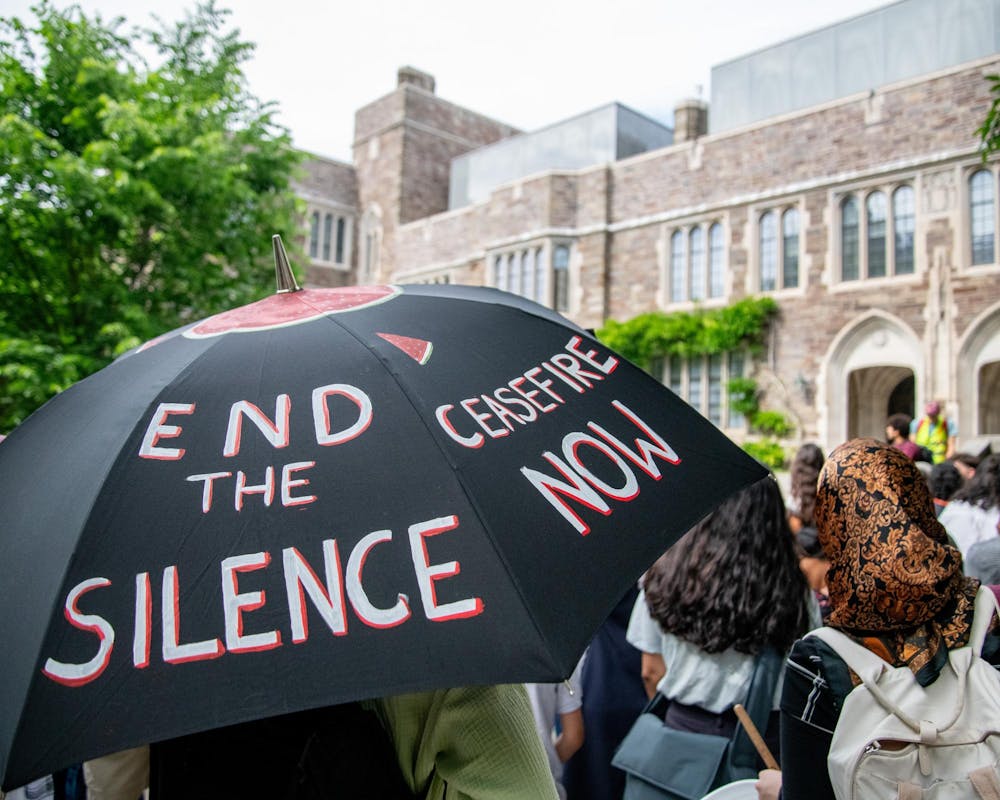Students organizing with Princeton Israeli Apartheid Divest (PIAD) met with the Resources Committee of the Council of the Princeton University Committee (CPUC) the afternoon of Thursday, May 23, and welcomed students arrested for pro-Palestine activism back onto campus this week as the school year draws to a close.
“It’s so good to be back,” said Sofia Menemenlis GS during a town hall gathering in McCosh Courtyard on Thursday. Menemenlis was one of the 13 individuals arrested on April 29 for briefly occupying Clio Hall in association with the “Gaza Solidarity Encampment” at the University — this group was subsequently barred from campus. The University lifted their bans from campus on May 20, allowing the students back into their dorms and giving graduating seniors the opportunity to attend the University’s numerous end-of-year festivities.
Thursday’s protest and town hall are the first of their planned programming during Princeton Reunions, which runs from Thursday through Saturday.
The student arrestees were also permitted to return to campus for in-person final exams and thesis defenses prior to Monday, a spokesperson for PIAD confirmed. Hassan Sayed GS and Achinthya Sivalingam GS, the two graduate students arrested for pitching tents in McCosh Courtyard on the first day of Princeton’s sit-in, were also permitted back on campus last weekend.
While members of the sit-in’s bargaining team called discussions with the University in previous weeks unproductive, the Resources Committee today “committed to communicating with us in the weeks to come,” PIAD wrote in a statement on X.
PIAD is still formulating an exact proposal on divestment and disassociation, the group wrote in their statement. Their initial demands, released in December, called on the University to divest from companies tied to Israeli military activity in the West Bank and Gaza, along with an academic boycott of Israeli institutions. The demands of the sit-in were more expansive, additionally calling for the end of weapons research at Princeton funded by the Department of Defense.
After repeatedly criticizing the University’s emphasis on process in the face of what they say is an urgent issue, organizers signaled on Thursday a willingness to work through structured channels on divestment.
“We showed decisively that we meet CPUC’s criteria of sustained campus interest, central university values of human rights and scholarship at stake, and deliberative campus consensus,” PIAD wrote.

If the Resources Committee determines that those three criteria have indeed been met, it would then review specific companies in the University’s investment portfolio to determine if they “represent a direct and serious contradiction of the central value [at stake],” according to the Committee’s guidelines for investment decisions on “social responsibility” issues. However, the guidelines also note that they are “quite literally guidelines and do not require the Board [of Trustees] to follow any particular course of action with respect to any such issue.”
Alongside engaging with administrators in formal divestment proposal processes, organizers also talked of the need to pursue actions outside of the formal negotiations.
“We are in the process of working with them, but in order for this to happen, we need to keep up the pressure and continue to make it impossible for us to be ignored,” Menemenlis said in a town hall after Thursday’s Resources Committee meeting.
During the meeting, a group of approximately 100 students, faculty, and community members walked from Nassau Hall to the Julius Romo Rabinowitz (JRR) building, where the meeting was being held, banging on buckets and chanting in the hopes of being heard inside the building.

Their shouts of “shut it down” and “say it loud, say it clear, we want divestment here” were partially interrupted by the appearance of a man carrying a large Israeli flag, who began yelling at protesters and holding the flag above his head. Marshals for the protest urged people to ignore the man, and a few protestors climbed the steps to block him with keffiyehs. They were then joined by several men from Neturei Karta, an organization of Orthodox anti-Zionist Jews, carrying pro-Palestine and anti-Israel posters.
At one point, the men began leading protesters in a chant of “Judaism yes, Zionism no, the State of Israel has got to go.”
“We are here in support of the students because we are aware that these students are being falsely accused as antisemitic just because they stand up for the oppressed, just because they condemn war crimes,” Rabbi Dovid Feldman, a member of Neturei Karta, said in an interview with The Daily Princetonian. “Anti-Zionism is not antisemitic.”
At one point during the protest, the man holding the Israeli flag shouted that he was an alum of the University. Many other universities have seen pro-Palestine disruptions during end-of-year events, including at Harvard on Thursday morning, when more than 1,000 people walked out of commencement.
Correction: This piece and title was updated to better reflect the nature of the protesters interactions with the University and CPUC Resources Committee.
Miriam Waldvogel is an associate News editor and the investigations editor for the ‘Prince.’ She is from Stockton, Calif. and often covers campus activism and University accountability.
Please send any corrections to corrections[at]dailyprincetonian.com.








